
Satsvarupa dasa Goswami Maharaja
Spiritual Family CelebrationSaturday, July 5, 2025
What
Meeting of Disciples and friends of SDG
Where
The Veterans of Foreign Wars Hall
845 Hudson Avenue
Stuyvesant Falls, New York 12173There is plenty of parking near the Hall. The facility is just a few minutes’ walk from SDG’s home at 909 Albany Ave.
Schedule
10:00 – 10:30 A.M. Kirtana
10:30 – 11:15 A.M. Presentation by Satsvarupa Maharaja
11:15 – 12:30 P.M. Book Table
12:30 – 1:15 P.M. Arati and kirtana
1:15 — 2:15 P.M. Prasadam FeastContact
Baladeva Vidyabhusana at [email protected] or (518) 754-1108
Krsna dasi at [email protected] or (518) 822-7636SDG: “I request as many devotees as possible to attend so we can feel the family spirit strongly. I become very satisfied when we are all gathered together.”
******
Śrī Caitanya-caritāmṛta, Madhya-līlā 20.124–125: “O great learned devotee, although there are many faults in this material world, there is one good opportunity—the association with devotees. Such association brings about great happiness. . . . .”
Srila Prabhupāda: “Therefore, our Society is association. If we keep good association, then we don’t touch the darkness. What is the association? There is a song, sat-saṅga chāḍi’ kainu asate vilāsa, te-kāraṇe lāgila mora karma-bandha-phāṅsa (Gaurā Pahū, verse 3). Sat-saṅga. Sat-saṅga means association with the devotees. So the one poet, Vaiṣṇava poet, is regretting that, ‘I did not keep association with the devotees, and I wanted to enjoy life with the nondevotees. Therefore I’m being entangled in the fruitive activities.’ Karma bandha phāṅsa. Entanglement.” [Conversation with David Wynne, July 9, 1973, London]
If you would like to help, please contact Kṛṣṇa-bhajana dāsa at [email protected] or [email protected] and we will find you a service that utilizes your talents.
Srila Bhaktivinoda Thakura says: “I fall at the feet of Lord Gauranga,” and after begging for the holy name, he receives that maha-mantra.
We attain perfection by practice. The technical explanations of how to attain the spiritual body can be memorized, but that will not make us perfect. Like a child asking her mother, “How does the baby come out of you?” The mother answers, “When you grow up, you will know, and I won’t have to explain. And even if I explain now, you aren’t going to understand.” We have to practice Krsna consciousness. We have to take the association of the rasika Vaisnavas, live in Vrndavana, and render devotional service with all our senses.
******
Let me practice, just as I am now practicing the rudiments of japa. The day will come when Krsna will reveal Himself. But this is the place to work from, begging for the holy name:
“Please tell me, when will that day be mine—when my offenses will end and a taste for the pure holy name will be infused within my heart by the power of divine grace? . . . I shall buy and plunder the mellows of the name of Hari, and becoming thoroughly intoxicated . . . I will be constantly immersed in the sweet nectar of the holy name.” (Kabe Ha’be Bolo, verses 1, 7).
And you cannot attain this only by staying in your room and chanting:
“When will there be an awakening of compassion for all fallen souls, and when will this Bhaktivinoda, forgetting his own happiness, with a meek heart set out to propagate by humble entreaty the sacred order of Sri Caitanya Mahaprabhu?” (“Kabe Ha’be Bolo, verse 8).
******
I woke a little late, said prayers, and started japa a little late, so I rushed the first six rounds. The sixth one was 6:25. Rushing is all right, but of course I am supposed to be praying and savoring and worshiping the holy name. I don’t have anything to say about that. I am always dissatisfied and always eager to do more. Maybe I will overcome the worst and improve, but even when I do better, I realize that it still isn’t much.
One devotee I know who doubted the potency of the holy name (and who later gave up chanting) said he could not tell for certain whether his spiritual life was due to chanting or to something else, such as reading or God’s grace. But we cannot refuse the main recommendation and Srila Prabhupada’s specific quota of a mere sixteen rounds.
******
One gain from this japa-vrata of three weeks is that I realize the insignificance of sixteen rounds. Srila Prabhupada once said, “Sixteen rounds is nothing. My spiritual master used to say that unless one chants at least sixty-four rounds of japa, he is considered fallen (patita).” So Srila Prabhupada has leniently reduced this to an unavoidable number.
“According to his calculation, practically every one of us is fallen, but because we are trying to serve the Supreme Lord with all seriousness and without duplicity, we can expect the mercy of Lord Sri Caitanya Mahaprabhu, who is famous as patita-pavana, the deliverer of the fallen” (Nectar of Instruction, p. 54).
And:
“Such chanting must be offenseless in order to be of high quality. Mechanical chanting is not as powerful as chanting the holy name without offenses” (C.c., Adi 10.43, purport).
******
My chanting is not very powerful. I say I am begging. I am begging the Lord to allow me to hear with devotion, that is my bhakti. But begging sincerely, “Please, I must have this devotional service unto You. Please don’t deny me. This nectar is eluding me up to now and I can’t capture it by chasing after it or doubling my quota. Only by Your mercy.”
“O deliverer of the fallen, please give this treasure to me, for I have no one to turn to except for You.” (Prarthana, p. 26, Song 9, verse 3)
******
The benefit of chanting more each day on beads: you know there will always be another chance. What you did so far this morning may not have been very good, but there will be another opportunity. And even if none of your sessions are particularly good, they will add up. You are bound to have a few good moments out of so much chanting. But if you finish after sixteen, then there is no more chance, and tomorrow you will also probably chant poorly . . . so it goes with no room for improvement.
******
Don’t slight the Names. You do that when you deliberately think or do other things while you are fingering the beads and chanting. You don’t like being neglected, so don’t neglect the holy names. “O Holy Names, please notice at least that I am often attempting to chant Your names in ecstatic devotion. I cannot accomplish this on my own. I need Your help. One of these days my offenses will clear—please make it so.”
******
nāmāparādha-yuktānāṁ
nāmāny eva haranty agham
aviśrānti-prayuktāni
tāny evārtha-karāṇi ca“The chanting of Hare Krsna is recommended for persons who commit offenses, because if they continue chanting they will gradually chant offenselessly. Even if in the beginning one chants the Hare Krsna mantra with offenses, one will become free from such offenses by chanting again.” (Padma Purana, quoted in S.B. 6.3.32 purport)
But there are other things to do also, and they are worth repeating. One has to lead a pure life. One has to read only sastra, including the books of the Six Gosvamis. (But I cannot tell you, “Don’t talk to anyone, don’t read mail, don’t travel.” I am aware this vrata is almost over, and already new schemes are entering my thoughts during japa—what I will do in a few days, where we will park our van at Villa Vrndavana, who we will meet there, what we will say, what it will be like, some nondevotee books I may order to help my writing form . . . This doesn’t help. It was better when I was deep in the midst of this vrata time and wrestling with only immediate distractions. And yet they too could not be overcome.)
******
I pin my hope on chanting itself and the mercy of the Vaisnavas.
They say sinful life has ended. Liberation is achieved by once chanting the name of the Lord.
“As a result of chanting the Hare Krsna maha-mantra, one makes such great advancement in spiritual life that simultaneously his material existence terminates and he receives love of Godhead. The holy name of Krsna is so powerful that by chanting even one name, one very easily achieves these transcendental riches.” (C.c., Adi 8.28, purport).
******
(Coming to you, Srila Prabhupada, by looking at your picture, this next to last day of a japa retreat. And I have plans to speak of you in many lectures and to spend the best time of my mornings in your books. I will go on hearing your tapes at breakfast and lunch, whenever I can. I want to come close to you despite my lacks.)
I begin this second volume of my autobiography with a summary study of the Journal and Poems, written in 1985-1986. Because writing is so, important to me, it forms a crucial part of my life story. To walk you through my books is to share with you my most-cherished experience. Srila Prabhupada used to say, if you want to know me, read my books.” My books are open and honest because I use writing as a means to reach the authentic self. I walk forward and sometimes stumble and even fall as I go forward to find my truth. Actually, almost all my books are autobiographical. When I began the first volume of my long-running (sixty-volume) Every Day, Just Write, I titled it Welcome Home to the One big Book of Your Life. I will be writing summary studies from that series also. Even before I became a devotee of Krishna and disciple of Prabhupada, writing was my most important activity. It was my vocation and religion. I once told one of my hippie friends that writing was more important to me than living. He disagreed and said, “Your life is a Pyrrhic victory.” A Pyrrhic victory refers to a historical battle in which the victorious side suffers such great losses that it was really no victory at all. But I didn’t care for my friend’s opinion. I admired those writers who also considered writing more important than their life. The nineteenth-century Danish theologian Soren Kierkegaard was like that. He would write twelve hours a day, considering himself in the sight of God, and he produced a voluminous literature of world-class philosophy, still influential today. I also admired the tortured genius Franz Kafka, who wrote symbolical novels that are considered unique in world literature. Kafka worked at a full-time job, and he was only happy and liberated when he was writing. The American transcendentalist Henry David Thoreau was something of a hermit, and he wrote continuously in his journal, from which he extracted books like him immortal Walden, the true store of his living alone simply and self-sufficiently in a little cabin for two years. These men and other men and women like them were my models for a life well-lived by pursuing one’s art (including painters and musicians), wholeheartedly and with passion. In a sense I have already written my autobiography in the more than one hundred books I have published. But I have found a new life of expression in The Story of My Life, one volume of which has already been printed. I will continue my Story partly by reviewing the books I’ve already written and partly by doing writing assignments for The Practice of Writing Memoir {by Natalie Goldberg} which I introduce in the second entry of this volume. {Which I introduce in this second volume in the series}. I hope by these methods to entertain and enlighten readers in Krishna consciousness.
Journal and Poems is certainly in a different mood than Sanatorium or Under Dark Stars. It was written before I took to free-writing and wild expressions. The persona of Journal and Poems is of a conservative and dedicated ISKCON servant, member of the GBC, and a humble guru. He toes the party line and says that people should take shelter in ISKCON and be faithful to ISKCON. “ISKCON with all thy faults, I love thee.” So in a sense it’s a little archaic as I read it, but it has its own integrity. And I can appreciate it and readers can appreciate it even though I have evolved from its loyalty to institutionalism.
The book opens in January of 1985 at Gita-nagari. I say that Gita-nagari is very important to me and that it’s wrong when devotees see a farm life and say that it’s not as important for preaching as book distribution. The books tell the better way of life, or a place where Krishna consciousness is actually lived without false dependence on factory and city living. There is a place, we preach, where cows are not slaughtered and God conscious people live off the bounty of the earth. Therefore to prove the living truth of the sastras and to choose to live as Krishna chose to live when he came to the earth five thousand years ago, we maintain and develop our rural Krishna conscious village, the place where the Gita is sung. Unless there is such a place the world is doomed.
The book doesn’t start out with convalescence at Gita-nagari, it starts out with some travel. I travel to Miami to attend a GBC meeting and discuss about the governing body committee. Then I go to Vancouver, Canada and make a visit there where I’m a zonal guru. And then I get ready to go to Mayapura for the annual meeting. I wrote a poem called the Castor Tree Guru, which is significant to my viewpoint of myself as a guru. I’ll print it here:
The Castor Tree Guru
When there are no trees,
a castor tree is a big tree.
“I may be imperfect,
Prabhupada would say,
“But if I speak what Krsna says,
Then that is also perfect.”
And a prabhupadanuga
is in touch with the sakti.
The tree in the courtyard is also small,
but sturdy even in winter.
And springtime it will bud green
Let me grow as I am able,
even if I am small
and let me also shelter sisya birds
I am his footdust
His boy,
His saved,
His son,
His typist,
A bringer of a mango.
But I cannot rest on these credits.
Today also I am travelling
to his Mayapura.
I pray to stay a small tree,
since that is what I am
and to deliver these sisyas given to me.
By chanting and hearing
and always living with the Vaisnavas,
by preaching and urging myself and them
I’ll keep these ISKCON places sound
until the end of my life.
Baladeva told me that H.H. Kadamba-kānana Mahārāja has passed away. He stopped drinking water five days ago. Meanwhile, I had just written an email to Jayādvaita Svāmī saying the last I heard, Kadamba-kānana Mahārāja was still going strong, leading kīrtanas and giving lectures. How ignorant and out of touch I was. There was nothing in the mail about it this morning. I will probably hear soon from Jayādvaita Svāmī and ISKCON. This made me think a little about Prabhupāda’s disappearance on November 14th, 1977. For the entire day up to 7:30 PM, he laid on his bed withdrawn, not even talking to his caretakers. I stood at the foot of his bed, keeping a vigil, my eyes fixed on his fragile head and body. Like Śrīla Prabhupāda, Kadamba-kānana Mahārāja was fortunate to breathe his last breath in the auspicious Krishna-Balaram Mandir in Vṛndāvana. One hundred of Mahārāja’s disciples were with him, and his dear friend, Jayādvaita Svāmī, who stayed with Kadamba-kānana Mahārāja for months until the very end. They will speak about his brilliant future in the next life.
Kadamba-kānana Mahārāja’s passing away is like a part of ISKCON passing. Eventually all of its present members will die. And those who are thinking and serving in this movement, will be reborn to help Śrīla Prabhupāda increase his influence, working cooperatively. The dedicated individuals may be born to associate with likeminded pure devotees. So, death doesn’t stop a devotees’ devotional service. He or she takes it up more vigorously in the next life. This is confirmed in the scriptures. A sincere, determined member of Kṛṣṇa consciousness doesn’t get reborn in a hellish planet or one of the fabulous but temporary heavenly planets. A sincere and successful servitor joins the eternal saṅga of pure Vaiṣṇavas. Lament the departure of Kadamba-kānana Mahārāja, but then take up his cheerful, compassionate message—bring distracted souls into the shelter of Prabhupāda and Kṛṣṇa.
******
Now, let’s try to finish this page in a new direction. Praying to Lord Kṛṣṇa can be done by a five-year-old child as long as the prayer isn’t done with material desires. A child can rejoice in the glory of the Supreme Person and his creation. He can rejoice in the stars and flowers, as the energy of Govinda. He can love the Lord as a father and mother. The child prayer may be made in broken language, not following the rules and regulations of Sanskrit grammar. Go on writing like a child and please your Mother and Father.
******
“Random Notes” on Abhirāma dāsa’s “Memories of Prabhupāda”
Abhirāma said that when he first saw Śrīla Prabhupāda, his impression was that he was a true saint. And this was better than being God. (Some gurus claimed to be God. But that was salacious).
He said that Prabhupāda had a powerful countenance. Once, he and a few other devotees were walking with Prabhupāda near the temple in Brooklyn. They were walking to ISKCON Press quarters. The neighborhood was very bad. They saw three homeless people lying on a stoop. When Prabhupāda came up to them, they stood up and nodded at Śrīla Prabhupāda (showing respect). Prabhupāda said “Hare Kṛṣṇa.”
Abhirāma said Prabhupāda saw the best in him and others “almost naively.” Abhirāma said “I didn’t want to disappoint him.”
Another time, at Bhaktivedanta Manor, Prabhupāda was sleeping and Abhirāma was watching (guarding him.) Prabhupāda suddenly spoke in his sleep, “The drum should not be louder than the voice.” Abhirāma then went downstairs where an ārati was going on and he asked the drummer to play more softly. He was surprised that Prabhupāda spoke in his sleep about the drum.
One time Prabhupāda was talking about his imminent death. He said, “I have no lamentations.” (But then he said, “No, I do have one lamentation.”) One of the devotees volunteered, “Do you regret that you have not finished the Śrīmad-Bhāgavatam?” Prabhupāda said no. He then said, “I regret that I have not established varṇāśrama. 50% of my work is not completed.”
A devotee asked, “How can we establish varṇāśrama?” Prabhupāda said, “I will go to Gītā-nāgarī. I will teach to devotees how to live off the land.”
Devotees sent Prabhupāda get well cards and letters. The devotees read these aloud to Śrīla Prabhupāda. They read one from Siddha-svarūpa. He was a very charismatic devotee. He established his own group of followers and lived apart from ISKCON. But at one point he joined ISKCON and became initiated by Śrīla Prabhupāda. Then he left and went back to his homeland, Hawaii. In his ‘get well’ letter he said to Prabhupāda that, “I am in Hawaii. If you ever think of Hawaii, please think of me.”Prabhupāda choked up and tears came from his eyes. He said, “I am always thinking of you (and the service you have done).”
Abhirāma had many opportunities of watching Prabhupāda sleep, and then wake up. He said he was Prabhupāda’s “nurse.” He said he never observed grogginess in Prabhupāda when he woke up. He simply woke up and was normal without any grogginess.
Abhirāma had conversations with Prabhupāda, in which Prabhupāda suddenly stopped the conversation and didn’t speak any more. Then maybe two weeks later, Prabhupāda suddenly spoke and picked up exactly from where he had last spoke in his conversation to Abhirāma. Abhirāma was very surprised by this. At first, he thought Prabhupāda might be getting old, and speaking (incoherently). But then Abhirāma realized that Prabhupāda was exactly picking up from the conversation he was having two weeks before. He had a great memory.
In the last days of Prabhupāda’s illness Abhirāma and other devotees would be massaging Śrīla Prabhupāda five hours a day. One time while other devotees were massaging Prabhupāda, Abhirāma went to the next room (in Vṛndāvana) and tried to get some much-needed sleep. He was under a ceiling fan. Someone came to him and said that Prabhupāda wanted to see him. Abhirāma went in and Prabhupāda asked him, “Can you hear that sound?” (Prabhupāda had asked the devotees who were massaging him what that sound was, but they didn’t know.) Abhirāma listened and then he said, “It’s the ceiling fan over my head where I am sleeping”. Prabhupāda said that is all right. Keep the fan on. Abhirāma said no, he would turn it off. Again, Prabhupāda said that Abhirāma should leave the ceiling fan on.
(From Abhirāma’s talking memories of Prabhupāda, I could understand that he had a very intimate relationship with Prabhupāda, especially in his last days. As he said, he was a “nurse” of Prabhupāda and performed all intimate bodily services.)
pp. 125-128
Of course, this means clean inside and outside. The devotee’s mind, heart, intelligence, body, clothes, living place, place of work, place of worship, his personal and business dealings—all should be suci, clean. “Cleanliness is next to godliness” may be a homely proverb, but it has wisdom for those interested in spiritual life.
When we were just starting the first ISKCON school in 1972, His Divine Grace A. C. Bhaktivedanta Swami Prabhupada gave us advice stressing cleanliness.
The future preachers of KC Movement must learn to be suci, absolutely pure in all respects, & for this, practical cleansing is the basic teaching, e.g., not touching anything dirty to mouth. Mouth is dirtiest part, and infection can spread very easily by the mouth. There is word visakanya, or the policy of gradually poisoning a beautiful girl so she will adapt ad not be affected, then she will have the potency to assassinate by passing infection by mouth to some enemy. Water itself is most antiseptic, so soap is not always required. The boys should be taught, and also all devotees should also be taught to wash own dishes, hands, mouth—that means always washing. They should be given only what they will eat, so that nothing is left over, and while bathing they can wash their own cloth. Your country, America, will become so much degraded that they will appreciate if we are revolutionary clean.
—Letter to Satsvarupa dasa, 2 / 2 / 72
A revolution in cleanliness! Even the nondevotee’s eating is unclean: flesh and blood, pus from crabs, animals’ entrails and brains, fish, pigs, bugs. The meat-eater’s diet sound like a witch’s brew! He finishes eating and sometimes just wipes his hands across his pants for “cleaning up.” The modern bathroom is often equipped with shag carpet on the floor, magazine rack, and electric toothbrush—yet modern man is so primitive in hygiene that after passing stool he doesn’t bathe but merely fouls himself with paper and runs a little faucet water over his hands. His uncleanliness in mating needs not be mentioned here.
Krsna thus describes the asuras, the demoniac: “Neither cleanliness nor proper behavior not truth is found in them.” Cleanliness is also one of the four principles of religion, which are presently declining due to the age of Kali. In Srimad-Bhagavatam Srila Prabhupada explains:
The principles of religion do not stand on some dogmas or man-made formulas, but they stand on four primary regulative observances, namely austerity, cleanliness, mercy, and truthfulness…. Cleanliness is necessary both for mind and for the body. Simply bodily cleanliness may help to some extent, but cleanliness of the mind is necessary, and it is effected by glorifying the Supreme Lord. No one can cleanse the accumulated mental dust without glorifying the Supreme Lord. A godless civilization cannot cleanse the mind because it has no idea of God, and for this simple reason people under such a civilization cannot have good qualifications, however they may be materially equipped.
—Bhag. 1.17.25, purport
External cleanliness is important, but is has to be done in connection with Krsna. The high standard of cleanliness in worshiping the Deity in the temple indicates the worshiper’s devotion. Caitanya-caritamrta gives the account of Raghava Pandita, who went to great trouble to offer very clean coconuts to Lord Krsna in the temple. If there was the slightest discrepancy, Raghava Pandita would not consider the coconut suitable for offering to the Lord:
When the coconuts were brought, there was little time to offer them because it was already late. The servant, holding the container of coconuts, remained standing at the door.
Raghava Pandita saw that the servant touched the ceiling above the door and then touched the coconuts with the same hand.
Raghava Pandita then said, “People are always coming and going through that door. The dust from their feet blows up and touches the ceiling. After touching the ceiling above the door, you have touched the coconuts. Now they are no longer fit to be offered to Krsna because they are contaminated.”
Srila Bhaktisiddhanta Sarasvati Thakura states that Raghava Pandita was not simply a crazy fellow suffering from some cleansing phobia. He did not belong to the mundane world. In lower consciousness, accepting something to be spiritual when it is actually material is called bhauma ijya-dhih. Raghava Pandita was an eternal servant of Krsna, and everything he saw was related to the service of the Lord. He was always absorbed in the transcendental thought of how he could always serve Krsna with everything. Sometimes neophytes, devotees on the lower platform, try to imitate Raghava Pandita on the platform of material purity and impurity. Such imitation will not help anyone.
—Cc. Madhya 15.80-83
In other words, out of pure devotion the devotee wants to make the best and cleanest offering of worship to the Lord. Our spiritual master has encouraged us that when we are cleaning the paraphernalia for the Deity, we are actually cleaning our hearts.
pp. 215-219
Prabhupada was never indifferent or uninterested in anything connected with the Krsna consciousness movement. If he sometimes wouldn’t respond to a disciple’s question, that was his gravity, instructing us by ignoring us.
He was indifferent to his own health. In his desire to spread Krsna consciousness, he didn’t rest as he should have for someone his age. He continued traveling because he could not be indifferent to the fallen souls and to his disciples. He had created by his preaching and traveling the worldwide Krsna consciousness movement, and he had placed himself in the center as its upholder. He could not be indifferent. He said if a body is cut in the finger, the whole body suffers. When ISKCON in Argentina was closed by the government, Prabhupada worried and wrote in his Bhaktivedanta purports how he was worrying in the mood of Vasudeva: Vasudeva knew that his son Krsna could not be harmed, but he was in the ecstatic mood of anxious protection.
Prabhupada was detached from the bad names people used against Krsna consciousness in newspaper accounts, mostly because he saw the bright side of it—the fact that the newspapers were mentioning Krsna’s name. He cared for many things, yet on Krsna’s behalf he was also indifferent. Although much money came in, Prabhupäda was not concerned to keep any of it. He said his author’s royalties for writing so many books was to take two capatis a day. He was detached from the Fisher mansion purchased in Detroit and from other mansions. He was indifferent towards any books being printed about himself. He wanted Krsna glorified. He was also not very eager to meet big heads of state. When someone asked him, “Why don’t you try to meet President Nixon and tell him these things?” Prabhupada replied, “What good would it do?” He was prepared to meet with the Pope, but when their schedules did not coincide, he did not pursue it. He knew that posing for a picture with a head of state did not mean much.
He was certainly indifferent to women’s charms. He saw his female disciples as daughters and granddaughters and he respected their service to him. He saw them as spirit souls, but did not meet with them much in comparison to the meetings he had with his men disciples. He was not interested in sitting with women or looking at them for enjoyment.
He was indifferent to any kind of invitations to take tours in different cities he visited. He didn’t want to go somewhere to see special downtown centers or tourist places, shopping places, and he never went to cinemas or sports events. He did like nice parks where he could walk in the mornings, and he liked big meeting halls in the city if there was an audience there to hear him speak Krsna consciousness. He was interested in buildings for possible purchase as temples. Although he visited alluring cities like New York, London, and Paris, he was not interested to see the libraries, palaces, museums, natural wonders such as caves or waterfalls, seasides, or mountain resorts. They held no attraction for him. He preferred a simple room with a low desk where he could speak to guests and be among devotees for the best furthering of Krsna consciousness. If by his service he was thrust into some situation in the midst of opulence or distraction, however, he was indifferent to the situation, even though externally it was in opposition to his way of life.
Especially in the first years in America, Prabhupada was indifferent to the fact that his hosts in Pennsylvania ate meat or that he was moving into the hell of the material world known as the Bowery. He was indifferent to the fact that his first disciples were very sinful before becoming devotees. In such situations, he accepted and tolerated and was detached even from the desire to be in the most spiritual surroundings of a holy place. He was indifferent to a place being holy or unholy, as long as he was able to preach.
He kept a simple diet and wasn’t interested in special foods such as the special cooking which the Italians could offer, or the French, or the Americans. Even within the Indian diet, which was his preference, he was not interested in fancy things, but in simple rice, dal, capatis, and sabji.
He was indifferent to clothes and would not sport any bright scarves or colorful cadars or special shoes or coats or hats. His simple sannyasi dress he kept constant. He liked bright clothes for the Deities and the opportunity to spend money to build wonderful buildings and new ways to spread Krsna consciousness, such as through dioramas. He also liked and appreciated the best quality in book printing and color reproduction of the paintings. In these things, even in their worldly aspects, Srila Prabhupada was a connoisseur, a keen appreciator of quality, and he asked his devotees to compete in the market for the best quality and price; they should get the best deal and the best product for use in Krsna’s service.
pp. 46-50
Load on the wrongs,
the injustice
pile it on one side of the scale—
count the money lost
by mismanagement,
count the devotees burnt out,
in anger name the names,
cite the big mistakes.
And who has caused the low esteem
our movement has in the public eyes?
And I am looking for Godmothers
who will read with me
what Prabhupada has taught.
But they are right,
so much has gone wrong,
and much has to change . . .
Reform will come
from the people
who are serving still
‘tho some hearts are a little hard now.
And who is to blame for that?
I bow down
to my disciple
as he recites his mantra
unto me.
In return I recite,
“A Vaisnava is
an ocean of mercy,”
by which I mean,
“You are so surrendered
to Krsna and parampara
that you accept me
as your guru.
I offer my obeisances to you.”
If my disciple
surpasses me
I will gladly watch
his plane to Vaikuntha
soar over my head.
And if the Visnudutas ask him
who gave him his beads
maybe I also
will be carried into the presence
of my disciple’s param guru,
who will keep me at his lotus feet.
He came to me
muscular and powerful
with his fist
ready to beat me for
what I have done.
But when I said
“You are not this body!”
he stopped and listened.
I tried, to say further
“You are eternal spirit soul,”
but I had exhaled
my last puff of breath-
I couldn’t speak more.
Father, forgive me:
I know you are angry
and I am sorry
that I was not strong enough
to breathe into you the life of
Krsna consciousness.
Last night I dreamt
you wanted to live near
me and I was moving back
to the home of my youth.
As I woke,
the predawn bull frog
reminded me of a time
when I was living at leisure
in my cabin.
But if these thoughts lack
intense desire
to serve Lord Krsna,
aren’t they just
srama eva hi kevalam?
My dear Lord Krsna,
as I hear about You
in Your Srimad-Bhagavatam
sometimes I understand You better,
as when I heard from Lord Brahma:
“With great zeal,” he said,
“I have caught hold of the lotus feet
of the Supreme Personality of Godhead
and whatever I say
has never proved to be false,
nor are my senses ever degraded
by temporary attachment to matter.”
Lord Brahma also said
that none of us can ever know
much about Sri Krsna
and whatever little we know
comes only through devotional service.
Supreme Lord, even when I hear
these relishable statements of
the Bhagavatam.
I am soon beset with distractions:
I read more with duty than with
love. But I am trying to go deeper.
And I know that book-study must
be accompanied by real acts.
I request You please,
draw me into the Srimad-Bhagavatam
and Caitanya-caritamrta,
so that I become anxious
whenever I am not hearing
from Vyasadeva and Krsnadasa Kaviraja,
as explained by Srila Prabhupada.
Please bless me with taste
for the nectar of study
even if others think I am unbalanced.
I know that any one of the nine
forms of devotional service can
carry me to full surrender. And
the method of reading books was
stressed by Srlla Prabhupada.
If I can hear about You
in pure service mood,
You will reveal Yourself to me
just as You did to Maharaja Pariksit,
who invites us by his example
to meet impending death
fearlessly hearing about You.
You came to the temple
dropped out from Harvard,
curious about Krsna
in 1971.
The first time
I spoke with you,
you quoted Bob Dylan,
“Do your own thing
and you’ll be king.”
Gentle and sincere
you are still,
but back then
you weren’t writing
your lucid, lively
Krsna conscious essays.
Surveillance is up 700%,
But can they really listen?
They can point their machines
at your building
but how is it possible
to know
unless the heart is pure?
Let them point it
at our Bhagavatam class and
hear what they can. But maybe
they’ll take offense when
Sukadeva calls them hogs,
asses, camels, and dogs.
We’ll be misunderstood.
But there is no harm
if they hear Sanskrit sounds
or plans of a devotee.
If we’re illegal or immoral
and if government agents
expose hypocrisy,
we should be grateful for that.
We don’t want privacy,
approval, or disapproval,
we simply want to please
the Supreme Lord
who is in everyone’s heart—
the complete and perfect witness
whose infallible agents are
the sun, air, moon, and demigods.
Only He knows
what “they” and “we” are doing,
and what is best for everyone.
Let us proclaim it,
and fill the machines
with good news.
pp. 35-40
When my father was released from active duty in the U.S. Navy, after World War II had ended, our family of four, the Guarinos, moved to a humble second-story apartment in Queens, New York. Queens is a borough in New York City on the western end of Long Island, and is renowned for being the most linguistically and ethnically diverse locale globally. On its eastern edge it is bordered by the borough of Brooklyn, and the division between them was known by the shoppers as “City Line.” We lived at City Line, and my father was a fulltime fireman enlisted in the New York City Fire Department. He had active duty daily, fighting fires in the busy section of Queens and Brooklyn.
At this time there were two children and our parents in our close Guarino family. But my father had higher ideas about where to live, now that he had some money gained from discharge and war service. So, he decided to build a house in a more congenial place for us children to grow up in. He personally found a plot of land on the neighboring borough, Staten Island, New York. At that time in the 1940s, money was not so difficult to attain for a serviceman. So, Father bought a small plot of land in the neighboring borough of Staten Island, which you had to reach by the Staten Island ferryboat. I was about eight years old when we made the move, and I was in the fourth grade of public school. (Our father didn’t want us attending the Catholic parochial schools. He thought we’d get a broader-minded education in the public schools.) I went there once with my parents, met a young boy my age, and we played in the fields while my father tried to deal about buying the land and how to build a house there. It didn’t take him so long (he was a handyman and a worker) to find land and plan for an architect, contractors, and himself personally working as a laborer, to build a modest Cape Cod house in the heart of rural Staten Island.
My mother saw that we were Catholics but there wasn’t much to it. We went every Sunday to Mass and at least once a year to confession and communion. Father was indifferent toward religion. He saw the priests as money collectors most interested in collecting funds from the parishioners. He didn’t think they were holy men. And he himself, coming from the Navy, experienced life among men as something profane, even obscene, that they would surround themselves with. He didn’t see any advantage in us being trained by nuns.
As I said, our family did not put me into the parochial school, where the nuns taught and a priest was in charge, but a public school where there was much more mixture and not emphasis on religion.
Although we were given religion for only two hours a week by the city, at that time the religious-inclined children would walk, with a monitor, a few blocks to the local religious center, which might happen to be a Catholic church, or even a Jewish-run place or a place of Protestants or another denomination. Only two hours a week to learn religion! But I liked it, and I remember seeing where I particularly pleased a priest. He came in in a visiting mood to our classroom and asked a question to examine us. He said, “What is it called that the Virgin Mary gave birth to Jesus without any sexual contact with her husband?” I knew the answer and quickly raised my hand. I said, “This is called the immaculate conception.” He beamed and showed his pride in me as a student who is learning religion even without regularly attending the Church classes. Other than that, I was not a religious boy. I had no mystic experiences and was not particularly obedient to the rules of the Church. I was an American like my father, who would fight in the war or work as a fireman, not a priest. My father almost abhorred priests, with their money-collecting attitude and the fact that they never had sex with their wife. He openly showed his disdain for the priesthood.
We learned religion by reading the catechism. The catechism is a book of questions and answers, questions and answers. A question is asked, like the immaculate birth of Jesus, and then a student is supposed to have memorized all the answers to the questions. So, we were tested basically on the basis of the “absolute” catechism.
We grew up as Catholics only until we reached an older age, sometimes known as the generation gap, and we became exposed to other religions, and in school we learned of other faiths and denominations, and even heard atheistic arguments against God and the existence of God. Many Catholics dropped out because they found abuses and faults in the Church, and as part of growing up in teenage life, they became lusty when they grew into upper teenage life.
Although I gradually rejected my religious upbringing, I was still looking, seeking for higher truth and a more spiritual life. I found all this in abundance at the lotus feet of my spiritual master, A.C. Bhaktivedanta Swami Prabhupada. This happened after quite a few years of disappointment and sinful life, and I did not take complete shelter in the great saint until I was twenty-five years old.
I was a Catholic as a young boy.
I recalled those devotional feelings, her sufferings
and her devotion to her holy son, Jesus.
I have long outgrown those feelings,
ever since I adopted Krsna consciousness
almost 60 years ago.
But I remember devotion to the mother of God
And how mine was pure.
Some of it is with me still today.
It is now morphed into love for Krsna.
The holiest saint,
she had the greatest love for God and suffered the most.
I drifted off to sleep dreaming of her,
and how she is now aligned to my memories of Radhika,
Radharani.
I hope Srila Prabhupada is pleased with me
for this dream,
this amalgam reverie.
I surely merged it into thoughts of the Virgin Mary,
and after a day full of headaches
I slept peacefully.
I was a holy boy when I was but a child,
and I prayed to the Virgin Mary.
Certainly those early years
were surged in childhood devotion to God.
May Mother Mary
protect me
as I wane in my close-to-death years,
and bring me close again to Jesus, her holy son,
and bring me again, surged, to the holiest motherhood
of Vraja.
—The Journals of Satsvarupa dasa Goswami, Volume 5,
Renewal: Solving the Problem, pp. 236–237
pp. 143-46
I dreamt of Srila Prabhupada. I was his servant on a temple visit. I was impressed with the simple enthusiasm of those days and the feeling of it being special to serve him. My first impressions (on waking) were to want to go back to such a simple life, to recapture it. In those days, we had Srila Prabhupada’s association and service and nothing else mattered.
We can’t go back to those days. Still, I want to lovingly serve him in this lifetime. I suppose the dream can’t change the priorities I have been discussing in these retreat notes. For example, in the name of wanting the taste of Srila Prabhupada’s personal service (“the taste of the good old days”) I can’t just take over the management of one of his centers. Don’t do something inebriated like preach that Srila Prabhupada is the only guru for ISKCON or that no one should write any books, only read his books, etc.. These are desperate and ignorant attempts.
My “crazy” free-writing? My life with not enough direct reference to Srila Prabhupada? Well, I can do something, I’m sure, to increase the purity and directness of my service to him. Srila Prabhupada himself didn’t cultivate a constant nostalgia of the good old days with his guru, but he always kept a personal focus of carrying out his Gurudeva’s order with one hundred per cent faith in his spiritual master. If there’s something I can do to work in that spirit, then try for it.
Be careful not to try and impress his followers with my faithfulness. The connection of my life-work and meditation on Srila Prabhupada should be one I feel personally. I don’t think I can always be writing books of memories of my days with him, although sometimes I can. But even when I spend extra time chanting japa, I should be doing it with thoughts of him. Always be in some kind of Prabhupada consciousness.
I’m grateful that dream came. I ask forgiveness from those followers of his I may have offended. All glories to Prabhupada and the many ways in which devotees are serving him.
Keep in mind: if some special services come my way for the Centennial, try to do them if they are in my line. Someone mentioned writing the text for a pictorial biography. Maybe I could start on that in 1994. Maybe other writings too. Although gathering reminiscences doesn’t seem to be what I want to do now.
What about more Prabhupada Meditations?
Reading in Bhakti-rasamrta-sindhu (NOD) regarding hard and soft hearts. Which is better and which do I have? The hard heart doesn’t melt easily, it’s deep and it’s also large. In a large city, elephants and chariots are not noticed, but in a small village even small things are noticeable. We usually use the words “hard heart” in a derogatory way, but this is a more technical use of the words.
When emotions arise, as in my dream of Srila Prabhupada, I often turn to my free-writing work and ask if it’s all right? Because of its external symptoms, the free-writing can be easily criticized. I mean its concentration on myself and the fact that we allow whatever comes to mind to be expressed. Beneath the surface of such randomness and self-absorption lies a deeper purpose.
I read a statement by a doctor who was a friend of Van Gogh in his last days of madness. He said that Van Gogh had too much faith in art and became a martyr. I suppose I could have too much faith in free-writing. Better not to always think I’m following a particular method of writing with trust in “first thoughts are best thoughts.” Rather, I take some tips here and there and plunge into the river of writing whatever comes in search of myself and in search of how to surrender to Krsna. When I find a topic worth working on, I stay with it.
To keep free-writing sane and healthy, I only publish things that are directly Krsna conscious or that are obviously leading to the Krsna conscious moment of truth. Or I describe Srila Prabhupada or Lord Krsna.
Free-writing assumes one’s life is dedicated to Krsna consciousness. If that’s a fact, then the writing of what/ comes in a sincere sadhaka’s struggle has value to him/ and to others.
It can be easily misunderstood and misused. I shou not print things that are mundane. I should not things in life that are unfavorable to Krsna consciouness. Revise your life, Stafford advises the writer. Ye that’s what I need to do. And writing is merely a record of what I just did in the immediate or remote past. It also helps create the present and future.
Hare Krsna, Hare Krsna. These days alone for increased chanting at the seaside and careful observation of what changes occur. I don’t expect miracles. But I look at the sea and sometimes pray (like yesterday), “Please reveal to me the nature of the holy name.” The prayer-application is made and I can also listen closely to any answer Krsna gives in the heart. We need t discern if “the answer” comes from our own intelligence or from the Lord and His pure devotees.
I also have written this note to myself, “Face fears. Yes the barren seaside is a good place for this. I advise myself not to panic and want to break out of here. Don’t try to prove that you are busy and active in ISKCON. Relax and concentrate on the work (and peace) you came here to seek and find. That means japa increase and what can be derived from that. Time for writing the retreat setting, this time with no intentions of making a particular book as I usually do. Work on these areas especially. Steadily hear Srila Prabhupada’s tapes.
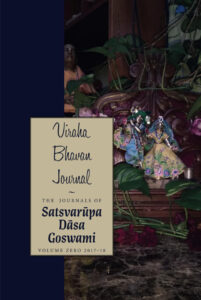
Viraha Bhavan Journal (2017–2018) was written by Satsvarūpa Mahārāja following a brief hiatus in writing activity, and was originally intended to be volume 1 in a series of published journals. However, following its completion and publication, Mahārāja again stopped writing books, subsequently focusing only on what became his current online journal, which began in August of 2018.
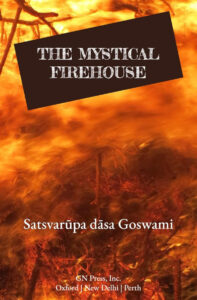
At first, I took it hard that I would have to live surrounded by the firemen, and without my own solitude. After all, for decades I had lived in my own house with my own books and my own friends. I was also now a crippled person who couldn’t walk, living among men who did active duties. But when Baladeva explained it to me, how it was not so bad living continually with other firemen and living in the firehouse with its limited facilities, I came to partially accept it and to accept the other men. I came to accept my new situation. I would live continually in the firehouse and mostly not go outside. I would not lead such a solitary life but associate with the other firemen.
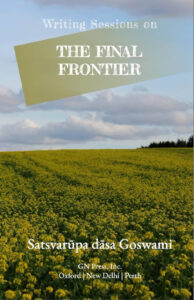
Let me write sweet prose.
Let me write not for my own benefit
but for the pleasure of Their Lordships.
Let me please Kṛṣṇa,
that’s my only wish.
May Kṛṣṇa be pleased with me,
that’s my only hope and desire.
May Kṛṣṇa give me His blessings:
Kṛṣṇa Kṛṣṇa Kṛṣṇa Kṛṣṇa Kṛṣṇa he
Rāma Rāghava Rāma Rāghava
Rāma Rāghava rakṣa mām.
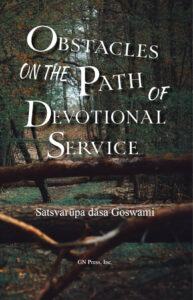
You mentioned that your pathway has become filled with stumbling blocks, but there are no stumbling blocks. I can kick out all those stumbling blocks immediately, provided you accept my guidance. With one stroke of my kick, I can kick out all stumbling blocks. —Letter by Śrīla Prabhupāda, December 9, 1972.
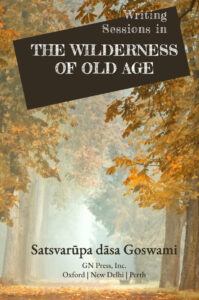
The Writing Sessions are my heart and soul. I’m trying my best to keep up with them. I am working with a few devotees, and they are far ahead of me. I wander in the wilderness of old age. I make my Writing Sessions as best I can. Every day I try to come up with a new subject. Today I am thinking of my parents. But I don’t think of them deeply. They are long gone from my life. Śrīla Prabhupāda wrote a poem when he was a sannyāsī, and he said now all my friends and relatives are gone. They are just a list of names now. I am like that too. I am a sannyāsī with a few friends. I love the books of Śrīla Prabhupāda. I try to keep up with them. I read as much as I can and then listen to his bhajanas.
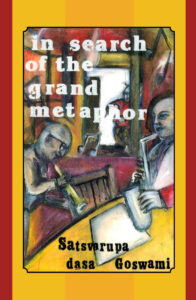
The metaphor is song. Explain it. Yes, particulars may not seem interesting or profound to readers who want structured books.
Wait a minute. Don’t pander to readers or concepts of Art. But Kṛṣṇa conscious criteria are important and must be followed. So, if your little splayed-out life-thoughts are all Kṛṣṇa conscious, then it’s no problem.
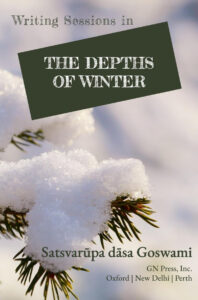
I am near the end of my days. But I do like the company of like-minded souls, especially those who are Kṛṣṇa conscious. Yes! I am prone to Kṛṣṇa consciousness. I have been a disciple of Bhaktivedanta Swami Prabhupāda for maybe almost sixty years. Sometimes I fail him. But I always bounce back and fall at his feet. It is a terrible thing that I sometimes do not have the highest love for him. It is a terrible thing. Actually, however, I never fall away from him. He always comes and catches me and brings me back to his loving arms.

This edition of Satsvarūpa dāsa Goswami’s 1996 timed book, Upstate: Room to Write, is published as part of a legacy project to restore Satsvarūpa Mahārāja’s writings to ‘in print’ status and make them globally available for current and future readers.
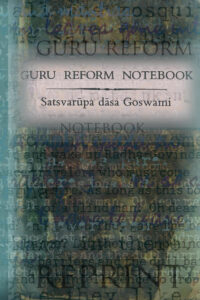
A factual record of the reform and change in ISKCON guru system of mid ’80s.
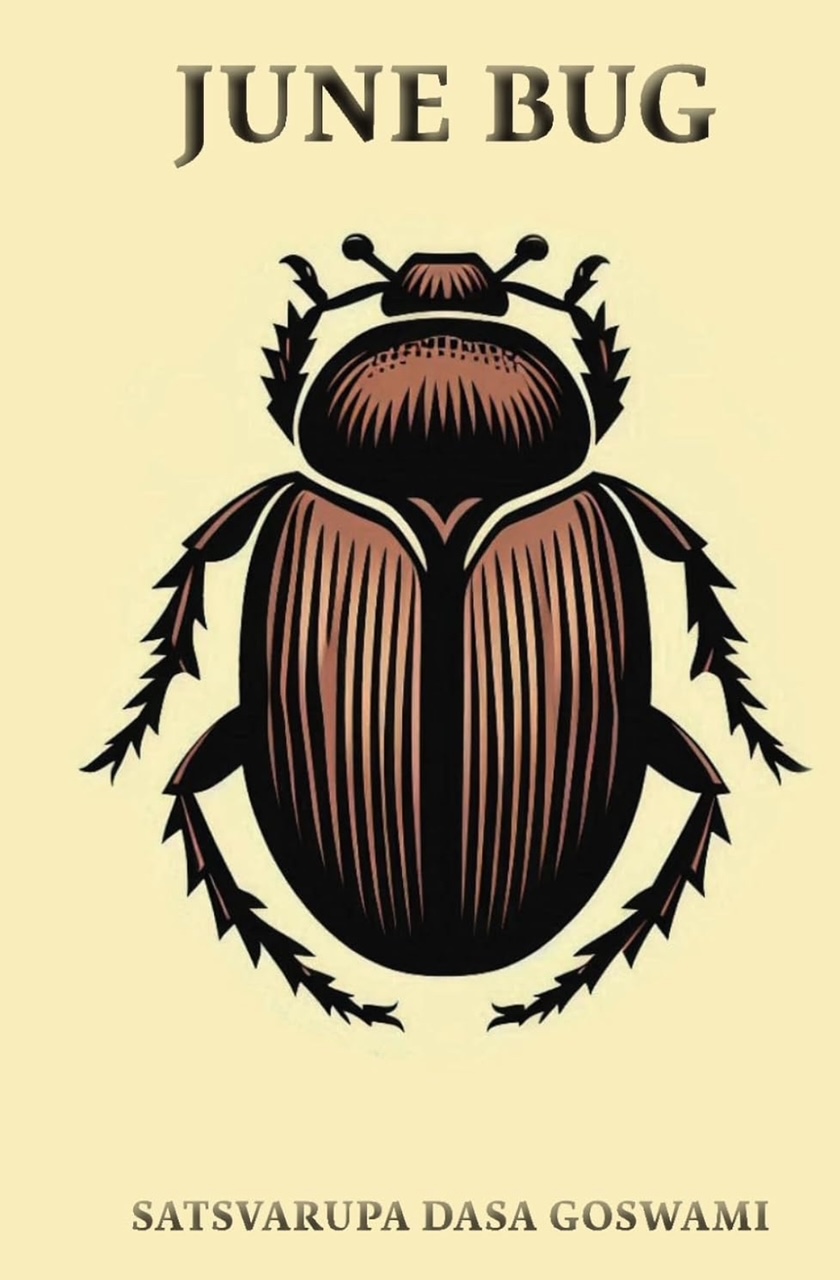
Readers will find, in the Appendix of this book, scans of a cover letter written by Satsvarūpa Mahārāja to the GN Press typist at the time, along with some of the original handwritten pages of June Bug. Together, these help to illustrate the process used by Mahārāja when writing his books during this period. These were timed books, in the sense that a distinct time period was allotted for the writing, during SDG’s travels as a visiting sannyāsī
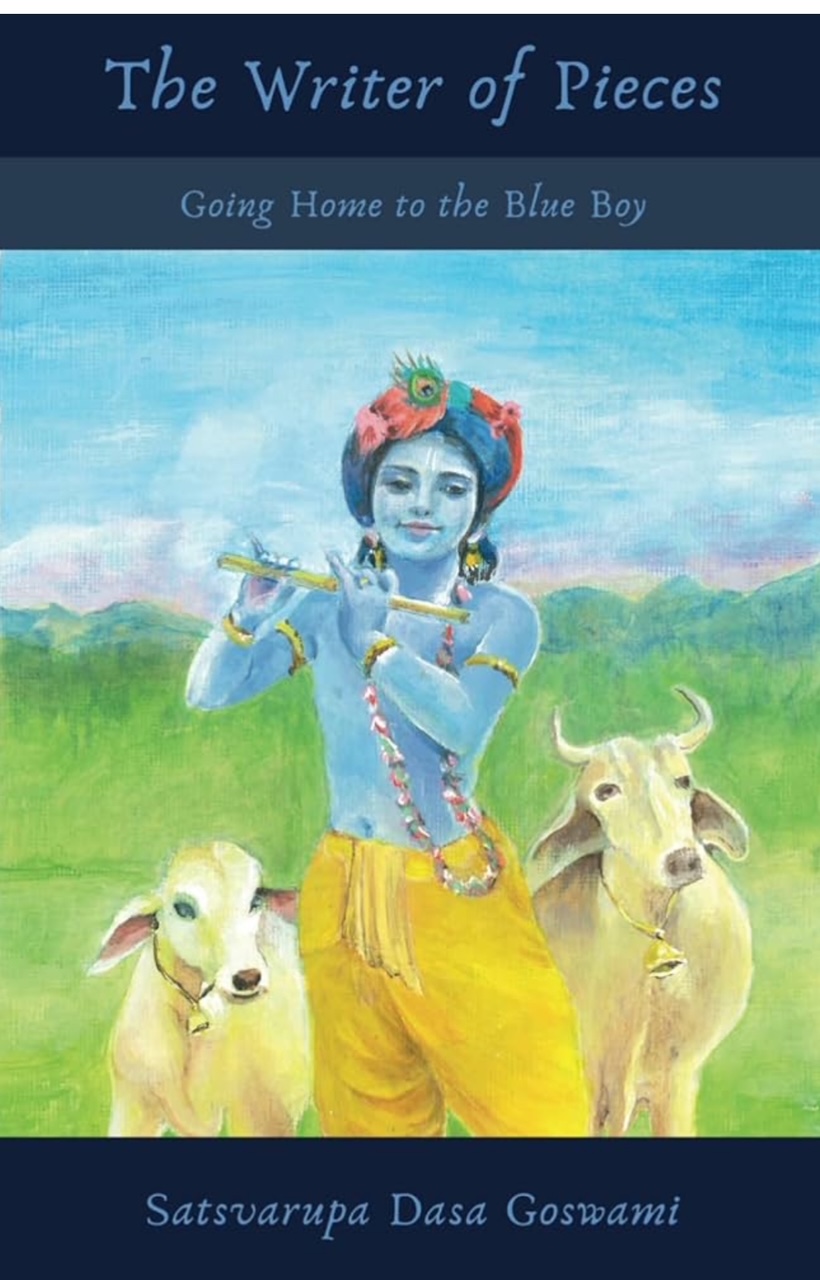
Don’t take my pieces away from me. I need them dearly. My pieces are my prayers to Kṛṣṇa. He wants me to have them, this is my way to love Him. Never take my pieces away.
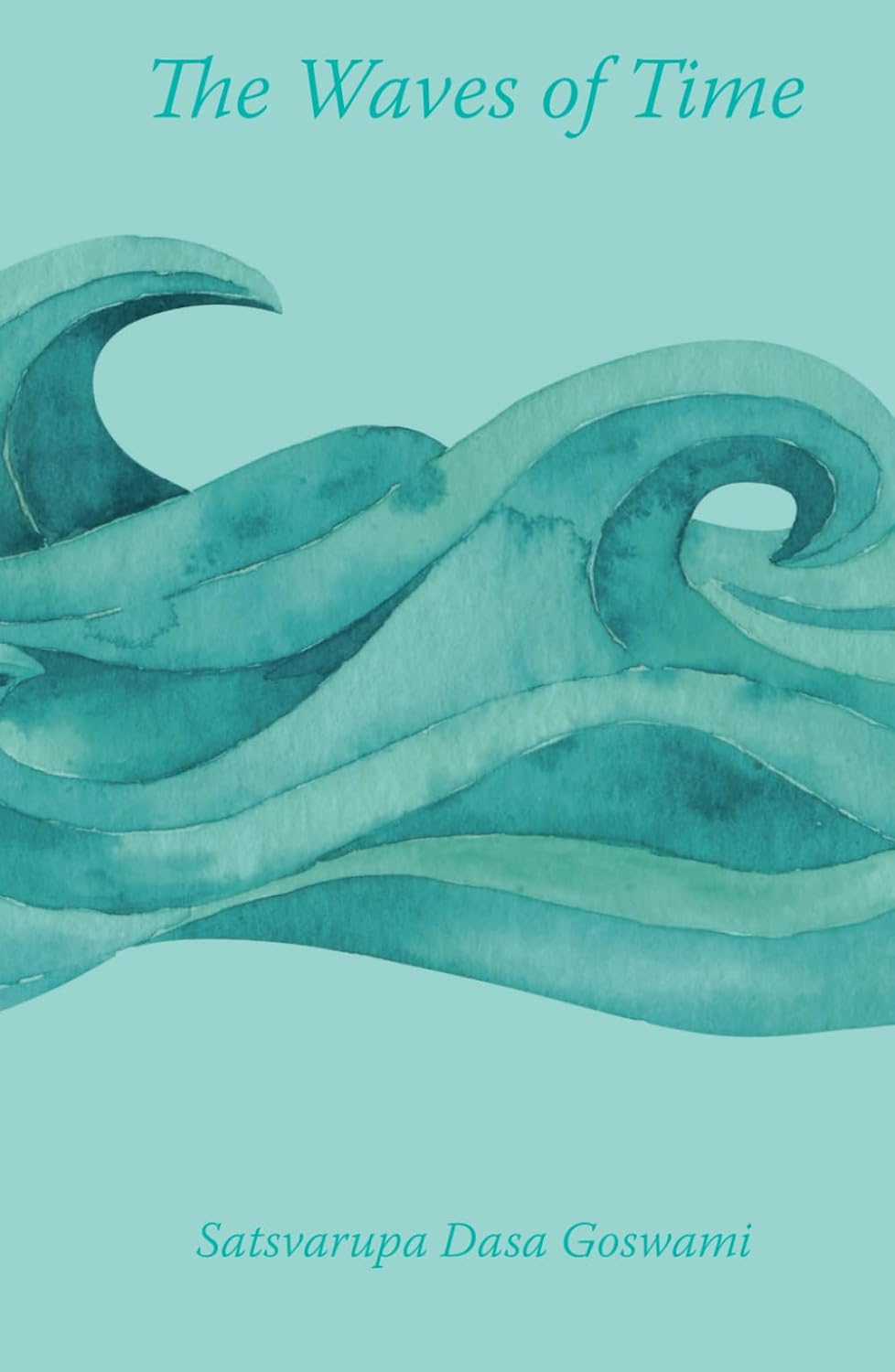
Many planks and sticks, unable to stay together, are carried away by the force of a river’s waves. Similarly, although we are intimately related with friends and family members, we are unable to stay together because of our varied past deeds and the waves of time.

To Śrīla Prabhupāda, who encouraged his devotees (including me) To write articles and books about Kṛṣṇa Consciousness.
I wrote him personally and asked if it was alright for his disciples to write books, Since he, our spiritual master, was already doing that. He wrote back and said that it was certainly alright For us to produce books.

I have a personal story to tell. It is a about a time (January–July 1974) I spent as a personal servant and secretary of my spiritual master, His Divine Grace A.C. Bhaktivedanta Swami Prabhupäda, founder-äcärya of the International Society for Krishna Consciousness. Although I have written extensively about Çréla Prabhupäda, I’ve hesitated to give this account, for fear it would expose me as a poor disciple. But now I’m going ahead, confident that the truth will purify both my readers and myself.

First published by The Gītā-nāgarī Press/GN Press in serialized form in the magazine Among Friends between 1996 and 2001, Best Use of a Bad Bargain is collected here for the first time in this new edition. This volume also contains essays written by Satsvarūpa dāsa Goswami for the occasional periodical, Hope This Meets You in Good Health, between 1994 and 2002, published by the ISKCON Health and Welfare Ministry.

This book has two purposes: to arouse our transcendental feelings of separation from a great personality, Śrīla Prabhupāda, and to encourage all sincere seekers of the Absolute Truth to go forward like an army under the banner of His Divine Grace A.C. Bhaktivedanta Swami Prabhupāda and the Kṛṣṇa consciousness movement.

A single volume collection of the Nimai novels.

Śrīla Prabhupāda was in the disciplic succession from the Brahmā-Mādhva-Gauḍīya sampradāya, the Vaiṣṇavas who advocate pure devotion to God and who understand Kṛṣṇa as the Supreme Personality of Godhead. He always described himself as simply a messenger who carried the paramparā teachings of his spiritual master and Lord Kṛṣṇa.

Dear Srila Prabhupada,
Please accept this or it’s worse than useless.
You have given me spiritual life
and so my time is yours.
You want me to be happy in Krishna consciousness
You want me to spread Krishna consciousness,

This collection of Satsvarūpa dāsa Goswami’s writings is comprised of essays that were originally published in Back to Godhead magazine between 1966 and 1978, and compiled in 1979 by Gita Nagari Press as the volume A Handbook for Kṛṣṇa Consciousness.

This second volume of Satsvarūpa dāsa Goswami’s Back to Godhead essays encompasses the last 11 years of his 20-year tenure as Editor-in-Chief of Back to Godhead magazine. The essays in this book consist mostly of SDG’s ‘Notes from the Editor’ column, which was typically featured towards the end of each issue starting in 1978 and running until Mahārāja retired from his duties as editor in 1989.

This collection of Satsvarupa dasa Goswami’s writings is comprised of essays that were originally published in Back to Godhead magazine between 1991 and 2002, picking up where Volume 2 leaves off. The volume is supplemented by essays about devotional service from issues of Satsvarupa dasa Goswami’s magazine, Among Friends, published in the 1990s.

“This is a different kind of book, written in my old age, observing Kṛṣṇa consciousness and assessing myself. I believe it fits under the category of ‘Literature in pursuance of the Vedic version.’ It is autobiography, from a Western-raised man, who has been transformed into a devotee of Kṛṣṇa by Śrīla Prabhupāda.”
 The Best I Could Do
The Best I Could DoI want to study this evolution of my art, my writing. I want to see what changed from the book In Search of the Grand Metaphor to the next book, The Last Days of the Year.
 a Hare Krishna Man
a Hare Krishna ManIt’s world enlightenment day
And devotees are giving out books
By milk of kindness, read one page
And your life can become perfect.
 Calling Out to Srila Prabhupada: Poems and Prayers
Calling Out to Srila Prabhupada: Poems and PrayersO Prabhupāda, whose purports are wonderfully clear, having been gathered from what was taught by the previous ācāryas and made all new; O Prabhupāda, who is always sober to expose the material illusion and blissful in knowledge of Kṛṣṇa, may we carefully read your Bhaktivedanta purports.

I use free-writing in my devotional service as part of my sādhana. It is a way for me to enter those realms of myself where only honesty matters; free-writing enables me to reach deeper levels of realization by my repeated attempt to “tell the truth quickly.” Free-writing takes me past polished prose. It takes me past literary effect. It takes me past the need to present something and allows me to just get down and say it. From the viewpoint of a writer, this dropping of all pretense is desirable.
 Geaglum Free Write
Geaglum Free WriteThis edition of Satsvarūpa dāsa Goswami’s 1996 timed book, Geaglum Free Write Diary, is published as part of a legacy project to restore Satsvarūpa Mahārāja’s writings to ‘in print’ status and make them globally available for current and future readers.